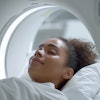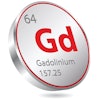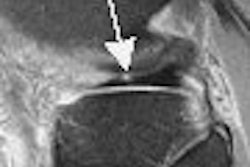Measuring cerebral metabolites with MR spectroscopy (MRS) could help mental health professionals tailor treatment regimens for elderly people with depression, according to Japanese researchers. They found that dysfunction in the frontal lobes is the most likely reason for cognitive impairment and possible depressive psychosis in an older population.
Previous MR studies have shown that elderly patients with depressive psychosis have more periventricular hyperintensities and deep white-matter hyperintensities, which most likely reflect cerebrovascular lesions and degenerative changes, explained neuroradiologist Dr. Hirotsugu Kado and colleagues from the Akita Research Institute for Brain and Blood Vessels in Akita, as well as Fukui University in Fukui.
In earlier research, Kado's group had made the connection between deep white-matter lesions and MRS data. The researchers determined that "the mean ratio of N-acetylaspartate (NAA) to the sum of creatine and phosphocreatine (Cr) in the late-onset depression group was lower than in the early-onset depression group" (Radiology, January 2006, Vol. 238:1, pp. 248-255).
"We believe that MR spectroscopic techniques will prove useful for improving our understanding of the pathologic mechanisms of depression in elderly patients," the group added.
For the current study, the team enrolled 52 patients (ages 52-78) who were diagnosed with geriatric depression. A control group was made up of 15 healthy volunteers (ages 54-74). All subjects underwent MR imaging on a 1.5-tesla unit (Signa, GE Healthcare, Chalfont St. Giles, U.K). The protocol included transverse spin-echo T1-weighted, T2-weighted, and intermediate-weighted sequences. Kado and co-author Dr. Hirohiko Kimura evaluated the images for high signal intensity using the Fazekas rating scale.
MRS data was acquired using point-resolved echo spectroscopy with 2000/136 and 65 signals. Symmetrical volumes of interest of 8 cm3 were placed in the deep white matter of the frontal lobe bilaterally. The major peaks for choline (Cho), Cr, and NAA were measured.
Finally, treatment with tricyclic and tetrcyclic antidepressants was administered by co-authors Dr. Ken Nagata, a neurologist, and Dr. Tetsuhito Murata, a psychiatrist.
Based on MRS results, the depressed patients were divided into two segments: group A had mean NAA/Cr values greater than 1.9; group B had mean NAA/Cr values of less than 1.91.
The results showed that the NAA/Cr ratio was lower in group B (1.69 in left frontal lobe; 1.67 in right frontal lobe) than in group A (2.18 in left frontal lobe; 2.15 in right frontal lobe). No significant difference in Cho/Cr ratio was observed. The total Fazekas rating scale score was higher in group B (3.3) than in group A (1.64).
Based on the ROC analysis, the sensitivity of MRS was 75%, the specificity was 89%, the positive predictive value was 86%, the negative predictive value was 81%, and the accuracy was 83%.
"These findings indicate that disorder or dysfunction in the frontal lobes may be associated with cognitive impairment in patients with depressive psychosis," the authors wrote. "These results suggest that the measurement of brain metabolism in the frontal lobes may help in estimating clinical prognosis...."
In fact, group A showed good response to antidepressants while those in group B -- with a reduction in frontal lobe NAA/Cr ratios -- had less than optimal reactions. These results suggest that if there are brain tissue disorders in the frontal lobe and brain stem, administering antidepressants may not be enough, the authors stated.
They added that one advantage MRS has over other imaging modalities, such as FDG-PET, is that it can assess axons in the white matter alone. FDG tends to have uptake in axons and glial cells in the white matter.
By Shalmali Pal
AuntMinnie.com staff writer
January 17, 2006
Related Reading
Depression raises colorectal cancer risk, November 3, 2005
Neuroimaging study bolsters genetic basis for feeling down, May 19, 2005
PET scan predicts risk of Alzheimer's disease, December 17, 2004
Copyright © 2006 AuntMinnie.com


.fFmgij6Hin.png?auto=compress%2Cformat&fit=crop&h=100&q=70&w=100)





.fFmgij6Hin.png?auto=compress%2Cformat&fit=crop&h=167&q=70&w=250)











